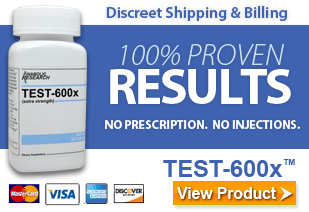Side-Effects of Methyltestosterone
When it comes to the common testosterone compounds, single large or small ester compounds and testosterone mixtures, the possible side-effects are largely the same. Then we have transdermal applications, and with such applications we introduce the possibility of skin irritation, and then we have the side-effects of Methyltestosterone. The side-effects of Methyltestosterone will be identical to injectable testosterone compounds; however, while there's no type of possible skin irritation as with a transdermal forms there's actually a larger concern. Methyltestosterone is an orally administered testosterone compound, and like most oral steroids it is C17-alpha alkylated (C17-aa). As a C17-aa anabolic steroid, this means it carries a hepatotoxic nature, and in this case, it is one of the most hepatotoxic steroids we could ever administer.
Beyond its hepatic nature, the side-effects of Methyltestosterone will largely revolve around those of an estrogenic nature, and to a degree cholesterol. Thankfully, such side-effects are extremely avoidable for the healthy adult male if he supplements responsibly. Even so, due to the extreme hepatic nature, this is typically not a steroid that comes with a strong recommendation of use; in-order to understand the specific purposes of use, please see the Methyltestosterone profile. At any rate, let's take a look at the side-effects of Methyltestosterone, the cause and effect and what you can do about them in-order to ensure your safety; after all, if your use isn't safe there is no justifiable point.
Hepatic Side-Effects of Methyltestosterone:
As Methyltestosterone is a C17-aa anabolic steroid, use will cause your liver enzyme values to increase, and abuse will more than likely lead to liver damage. While not appealing by any means, this hepatotoxic nature is necessary to this steroid's existence; it is a necessary evil. The C17-aa classification refers to a structural change of the hormone at the 17th carbon position that allows it to be administered orally; without this structural change, the hormone would be largely destroyed by the liver before any benefit could be obtained. Through this structural change, Methyltestosterone is enabled with the ability to survive the first pass through the liver, but as tradeoff it will burden the liver with stress. For this reason, use can only be considered by those with a healthy liver; if your liver isn't healthy, the additional stress will only burden your liver even more.

If your liver is healthy, it is imperative you avoid all other C17-aa anabolic steroids when using Methyltestosterone; in-fact, you should avoid all over the counter medications that carry a hepatotoxic nature, and this is quite a few. Then there's the big one, and it revolves around alcohol consumption. Excess alcohol consumption is very damaging to the liver to begin with, and with Methyltestosterone in play, with its already strong hepatotoxic nature it is highly advised that you avoid all alcohol consumption. It is imperative that you follow such rules if you are to supplement, but we're not done yet. In-order to prevent liver damage, you must not exceed a 50mg per day dosing, and for no reason should total use ever exceed four weeks. This doesn't mean your total cycle is only four weeks; in-fact, very few anabolic steroid cycles should be so short lived; however, the Methyltestosterone portion should not exceed this mark.
Estrogenic Side-Effects of Methyltestosterone & Cholesterol:
Like all testosterone compounds, Methyltestosterone has the ability to increase estrogen levels through a process known as aromatization; specifically, the conversion of testosterone into estrogen. As this occurs, as estrogen levels rise this can lead to gynecomastia or what is commonly referred to as male-breast enlargement. Further, excess estrogen can cause excess water retention, and due to this water retention and excess estrogen buildup it can greatly contribute to high blood pressure. While none of this sounds appealing, there is hope, and it's called an Aromatase Inhibitor (AI). With an AI, you will be enabled with the ability to do exactly what an AI sounds like it does; inhibit the aromatase process. Further, by its natural mode of action, an AI will actively reduce your body's total estrogen levels. Why is this important? It's important because what doesn't exist cannot cause a problem.
Beyond estrogenic effects, the side-effects of Methyltestosterone can include increased LDL cholesterol levels as well as decreased HDL; in-fact, your AI can even have a negative impact as well. For this reason, not only are responsible doses important but a responsible lifestyle. You should not be supplementing if you already have cholesterol issues, same as with blood pressure, but if you're healthy you should do everything you can to ensure your levels stay healthy. It's often advised that you consume plenty of omega fatty acids in your diet; omega fatty acids will raise your HDL levels, and HDL cholesterol largely regulates LDL cholesterol, and this will improve your total reading.
DHT Side-Effects of Methyltestosterone:
As with all testosterone compounds, the side-effects of Methyltestosterone can include those of a dihydrotestosterone (DHT) nature; however, such effects are normally unlikely. Testosterone can lead to a DHT buildup, another primary and necessary androgen; however, too large of a buildup can be problematic; specifically hair-loss and prostate enlargement. When it comes to hair-loss, this is only possible for those who are genetically predisposed to male-pattern baldness; you were already going to lose your hair. As for prostate enlargement, this is going to take a massive buildup of DHT, and such a buildup is unlikely with responsible use and a healthy prostate, but it is possible. If this occurs, the use of Finasteride is often advised as Finasteride can reduce prostate enlargement.
Testosterone Side-Effects of Methyltestosterone:
As a testosterone compound, at first glance the idea of the side-effects of Methyltestosterone including anything testosterone related might sound strange, but it will shortly make sense. Methyltestosterone will suppress your body's natural testosterone production; after all, you're providing the body with the testosterone it needs, and as a result it has no need for its own production. Of course, as testosterone is manufactured in the testicles, due to this suppression your testicles will atrophy; they will not vanish, but they will lose some of their fullness. At any rate, once use is discontinued, total testosterone recovery is more than possible. It must be noted; total testosterone recovery is dependent on two factors; you did not suffer from a low testosterone condition prior to supplementation and you did not damage your Hypothalamic-Pituitary-Gonadal Axis (HPTA) during supplementation with irresponsible practices. In any case, assuming you've met the rules of total testosterone recovery, once all anabolic steroid use has come to an end and all the exogenous hormones have left your body, your natural testosterone production will begin again, and your testicles will return to their normal size.


